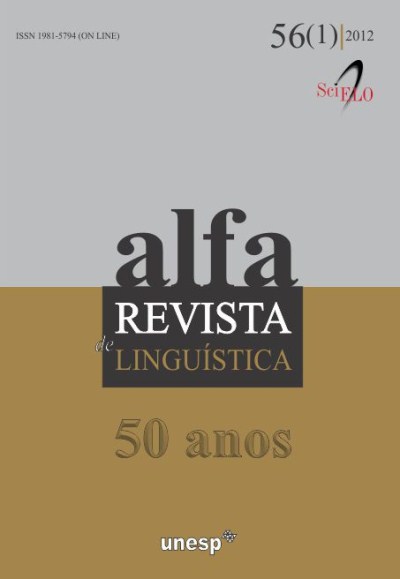Denominal verbs in Brazilian Portuguese: distinguishing between diachronic and synchronic structures within distributed morphology approach
Palavras-chave:
Denominal verbs, Morphosyntax, Argument structure, Distributed morphology, Phases,Resumo
Recent work on argument structure has shown that there must be a synchronic relation between nouns and derived verbs that can be treated in structural terms. However, a simple phonological/morphological identity or diachronic derivation between a verb and a noun cannot guarantee that there is a denominal structure in a synchronic approach. In this paper we observe the phenomenon of Denominal Verbs in Brazilian Portuguese and argue for a distinction between etymological and synchronic morphological derivation. The objectives of this paper are 1) to identify synchronic and formal criteria to define which diachronic Denominal Verbs can also be considered denominal under a synchronic analysis; and 2) to detect in which cases the label “denominal” can be justifiably abandoned. Based on results of argument structure tests submitted to the judgments of native speakers, it was possible to classify the supposed homogenous Denominal Verbs class into three major groups: Real Denominal Verbs, Root-derived Verbs, and Ambiguous Verbs. In a Distributed Morphology approach, it was possible to explain the distinction between these groups based on the ideia of phases in words and the locality of restriction in the interpretation of roots.Downloads
Não há dados estatísticos.
Downloads
Como Citar
BASSANI, I. de S. Denominal verbs in Brazilian Portuguese: distinguishing between diachronic and synchronic structures within distributed morphology approach. ALFA: Revista de Linguística, São Paulo, v. 56, n. 1, 2012. Disponível em: https://periodicos.fclar.unesp.br/alfa/article/view/4964. Acesso em: 27 fev. 2026.
Edição
Seção
Artigos Originais
Licença
Os manuscritos aceitos e publicados são de propriedade da Alfa: Revista de Linguística. É vedada a submissão integral ou parcial do manuscrito a qualquer outro periódico. A responsabilidade do conteúdo dos artigos é exclusiva dos autores. É vedada a tradução para outro idioma sem a autorização escrita do Editor ouvida a Comissão Editorial.

